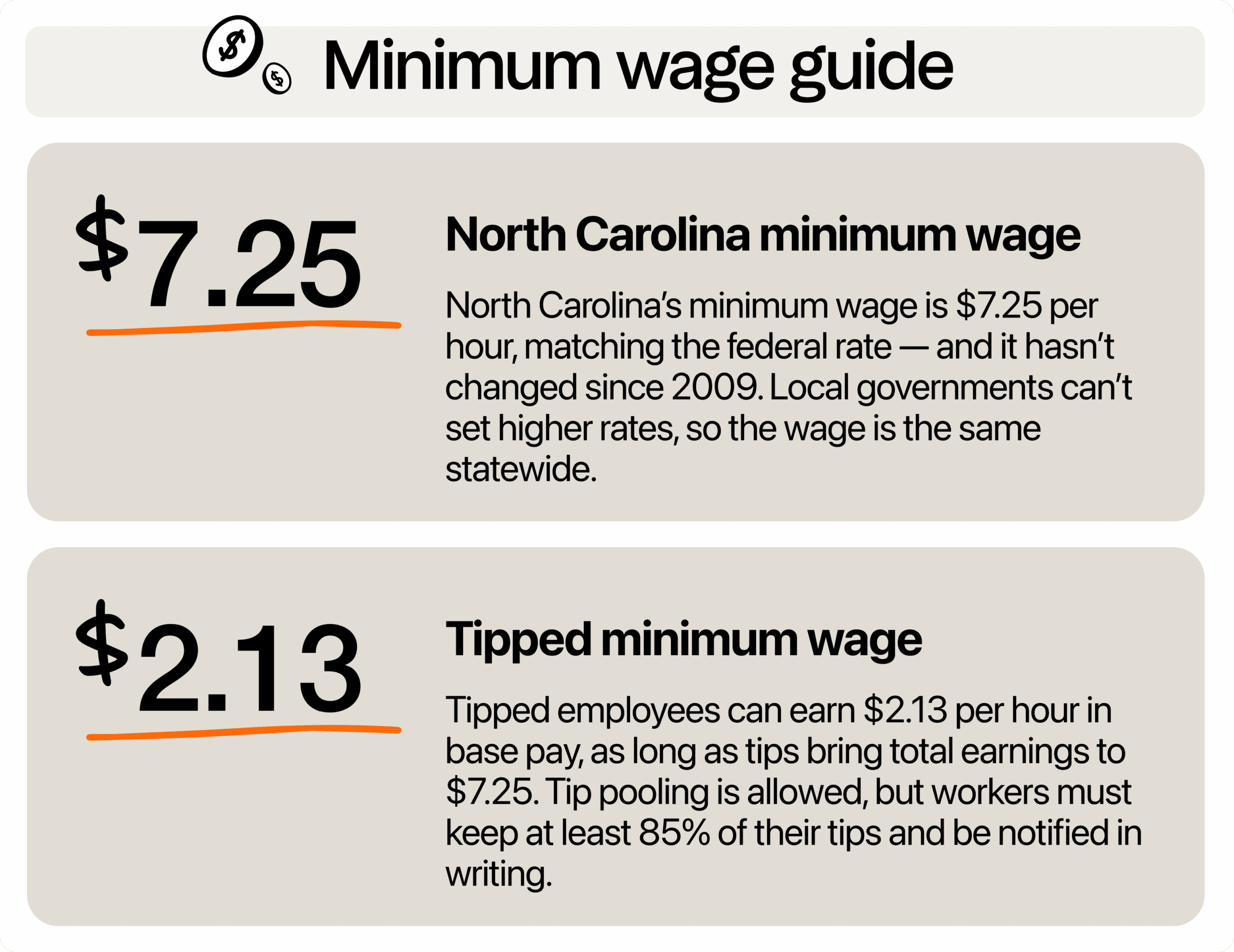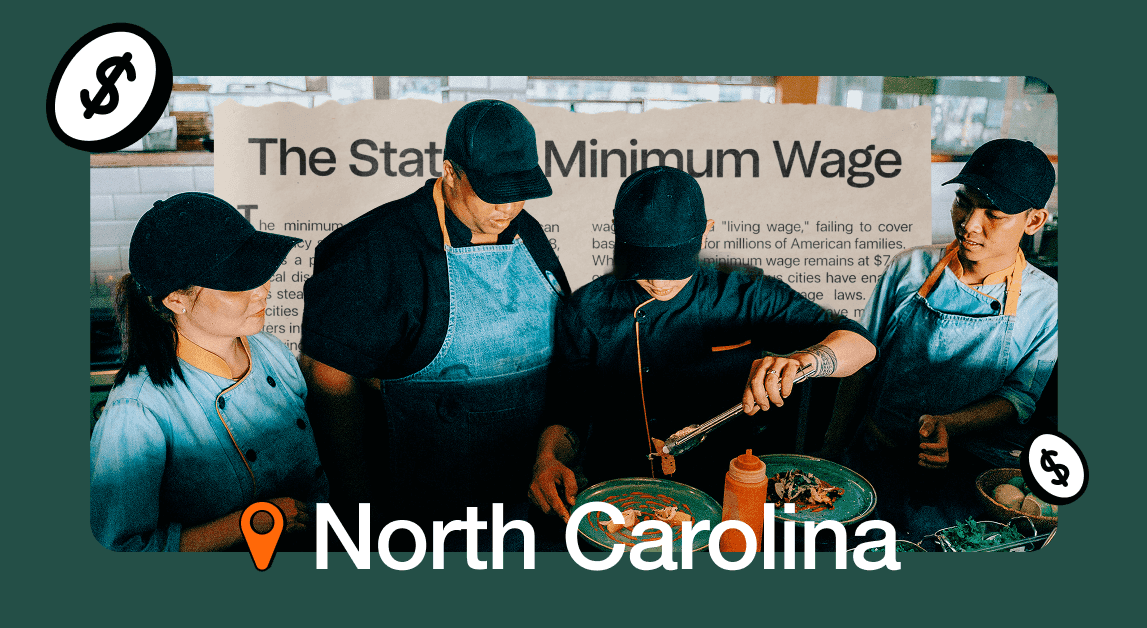The minimum wage in North Carolina follows the federal mandate of $7.25 per hour. At first glance, it seems great for business owners who can save money on labor costs. However, the reality is more complex. Here’s everything you need to know about wage laws in NC and what you can do to support your employees effectively.

What is the minimum wage in North Carolina?
As mentioned, the current minimum wage in North Carolina is $7.25 per hour, which is the same as the federal minimum. This state minimum, which hasn’t budged since 2009, applies to nearly every employee unless they’re exempt under NC Wage and Hour Act rules. That includes most hourly workers in the restaurant and hospitality industries.
Moreover, state law prevents local areas like Charlotte or Raleigh from setting higher rates.
Tipped employees, like servers and bartenders, can be paid as low as $2.13 per hour. Restaurant owners and similar entities must make sure tips bring each staff member’s total pay up to at least the minimum. If tips don’t cover the gap, employers must pay the difference so every worker reaches $7.25 per hour. Tip pooling is allowed, but employees must keep at least 85% of their tips, and you must keep clear records and notify workers in writing.
Aside from tip credits, North Carolina also allows subminimum pay in specific cases. For instance, workers under 20 can earn $4.25 per hour for their first 90 days on the job. Full-time student learners or apprentices can also be paid 90% minimum wage, which is about $6.53 per hour.
Additionally, workers with disabilities can be paid below the minimum if the employer has a valid certificate from the NC Wage & Hour Bureau. This encourages businesses to provide opportunities to people who might otherwise struggle to find employment.
For overtime pay, NC follows the federal fair labor standards. That means non-exempt employees must get 1.5× pay for hours over 40 a week. There’s no state rule about break time for adults, but minors must get a 30‑minute break.
How does North Carolina’s wage compare to neighboring states?
Just like North Carolina, South Carolina, and Tennessee follow the federal minimum wage. On the other hand, the minimum wage in Virginia is at $12.77 per hour. Plus, the state mandates that tipped employees get the minimum regardless of how much they receive from customers.
Knowing this, restaurants operating in Charlotte and Robinsville won’t have a problem facing wage competition. But those near Virginia, like Mt Airy and Eden, might feel pressure to raise wages to attract talent. The disparity of over $5 easily totals to $200 extra per week for full-time employees and is a reasonable cause for crossing state lines for employment.
Are there plans to increase NC minimum wage?
Multiple bills have been introduced over the years to increase NC’s minimum wage, but none have made it past committee or floor votes. In 2023, Senate Bill 440 proposed raising the wage rate to $15 per hour, effective January 2024. However, it stalled in the Senate rules committee and never passed.
At the same time, Senate Bill 447 (also 2023 session) aimed to eliminate subminimum wages (like for tipped workers or youth) and index pay to inflation, but also failed to push through. More recently, House Bill 353, called the Fair Minimum Wage Act, proposed raising North Carolina’s minimum to $18 per hour by 2030, with annual cost‑of‑living increases after that.
2026 Labor Costs Playbook
Increase your bottom line with insights from over 500 restaurant pros—learn the true cost of employee turnover, the best way to manage labor costs, and proven strategies to protect profits.

How can restaurants stay competitive and attract workers?
Following the federal minimum wage has its own pros and cons. On one hand, it helps business owners keep labor costs low, but it doesn’t show your commitment to your team’s well-being. Fortunately, it’s not a case of choosing one over the other. There are ways to attract and retain top talent without sacrificing your margins.
Offer a better compensation package
Just because it’s legal to pay $7.25 per hour (or $2.13 for tipped employees) doesn’t mean you should stick to the bare minimum. Offering a better compensation package shows that you value your employees and want them to actually be able to live comfortably.
If your restaurant’s only offering the state minimum wage, chances are you’re losing good people to places that pay even a little more. And it’s not just frustrating to go through the hiring process; it’s expensive. Employee turnover costs your restaurant between $1,000 and $2,600 or more for each employee you need to replace.
Higher pay won’t solve everything, though, but it helps. You don’t have to jump straight to $15 per hour. Start where your budget allows.
Even a small raise, like offering $8 or $9 per hour, can easily set you apart from competitors who just offer the state minimum. You can also combine modest pay bumps with other perks (like consistent scheduling or shift meals), and you’ll get more out of every dollar.
Review your menu and workflow
If you’re looking to free up a budget for better pay or hiring, your menu is a smart place to start. For many restaurants, labor and food are the two biggest factors affecting restaurant costs. Trimming waste in either area helps you stay competitive without raising prices across the board.
Start with your menu. Are there dishes that rarely get ordered but take extra time, ingredients, or labor to prep? Cutting low-margin, slow-moving items helps simplify kitchen operations and reduces strain on BOH staff, especially during a rush. A smaller, smarter menu also helps with training, consistency, and inventory management.
Next, look at ingredient overlap. Can you use proteins, sauces, or sides in multiple dishes? When your team can prep fewer ingredients but still offer variety, you save on food costs and reduce the chance of spoilage.
Finally, check your portion sizes and prep routines. Are you regularly tossing out unfinished food? Are staff spending time on complex prep that could be simplified or done in batches? Even small changes, like switching to pre-portioned ingredients or batching sauces, can shave off hours worked each week. That means more flexibility to reinvest in better pay or benefits.
Rethink pricing and guest experience
It’s time to get a different perspective on raising wages. Sometimes, it’s not about cutting into your profit, but charging more strategically. A small price increase across your menu, even by 25 to 50 cents per item, can generate enough margin to support higher pay without scaring off your regulars.
The key is pairing those increases with a standout guest experience. When diners see value in what they’re getting (great food, friendly service, a clean and welcoming space), they’re more likely to accept slightly higher prices.
Another option is to add a service charge or automatic gratuity, especially for large parties or during peak hours. This approach helps ensure your team gets paid fairly and predictably, especially tipped staff. Just make sure you’re upfront about it by printing on menus and receipts, and having your staff tell customers before they order.
Prioritize your team
North Carolina’s minimum wage hasn’t kept up with the times, but you can. By offering a competitive compensation package, you show that you’re committed to your team’s well-being and view them more than just line items on a spreadsheet.
It might be scary to think of raising wages when margins are tight. Use restaurant payroll software to help manage labor costs. 7shifts lets you build cost-effective schedules and automatically pull hours worked into payroll. This way, you can track labor expenses in real-time and spot scheduling inefficiencies.

Rebecca Hebert, Sales Development Representative
Rebecca Hebert
Sales Development Representative
Rebecca Hebert is a former restaurant industry professional with nearly 20 years of hands-on experience leading teams in fast-paced hospitality environments. Rebecca brings that firsthand knowledge to the tech side of the industry, helping restaurants streamline their operations with purpose-built workforce management solutions. As an active contributor to expansion efforts, she’s passionate about empowering restaurateurs with tools that genuinely support their day-to-day operations.
